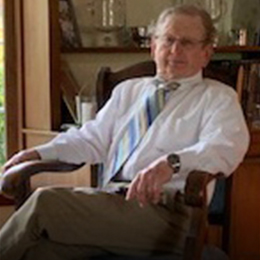Bruce M. Bingman
 Why did you choose Northwestern?
Why did you choose Northwestern?
I was recruited heavily by NU as an undergrad and after reviewing the academic and social opportunities decided, after years of military boarding school, to go to NU rather than use my appointment to the Naval Academy. After graduation and commissioning through the NROTC program, the Navy sent me back to grad school and I returned to NU based on their growing reputation in reactor analysis. I also was already heavily invested in advanced course work which allowed an early start into research.
How would you describe your research and/or work to a non-academic audience? What was it then and/or what it is now?
My research was in the field of analytical prediction of nuclear reactor behavior and performance using statistical methods combined with analytical deterministic methods. As part of this effort, I also worked on statistical prediction of the way sub atomic particles called neutrons interacted with reactor materials in energy ranges where exact behavior could not be experimentally measured. The theory and early programming schemes were developed but the CDC 6400, the “super computer” of the time (maybe equivalent to a small tablet today!), had barely enough capacity to show the programs ran and prove the research was valid. Interestingly, today with our modern supercomputers, much of the research is now being re-investigated and used. My contribution to these developments was recognized in 2017 when I was presented the Reactor Technology Award by the American Nuclear Society.
I am still involved in nuclear cross section measurement as an occasional consultant to the refurbishment of the RPI linear accelerator.
Tell us who or what inspired your research and/or work.
I have always been fascinated with statistics, integer arithmetic and probability analysis. Dr Elmer Lewis recognized this and guided me into this area.
After leaving NU, I returned to active duty with the Navy. I did a brief tour aboard a submarine following the Naval nuclear training program before being tapped by Admiral Rickover to join his staff at Naval Reactors. I worked there the remainder of my career, eventually becoming the Chief Physicist for the Naval propulsion program.
What are you most proud of in your career to date?
Overseeing the safe operation of over 100 shipboard reactors as well as directing the R&D leading to the design of the reactors aboard the newest generation of submarines and aircraft carriers. An important part of this effort was the awarding and administration of the Rickover Fellowships providing full support for promising graduate students to study topics in nuclear fields.
Tell us about a current achievement or something you're working on that excites you.
I continue to give presentations on the nuclear navy, its history and its achievements to encourage participation of the next generation. I s am also involved with the Naval Academy Varsity Offshore sailing program as a race officer and instructor.
What advice would you give your younger self or someone considering a similar path?
Do not be afraid to think outside the box but carefully balance the risk of the intuitive leap against the slow but more certain progress of step by step path building.